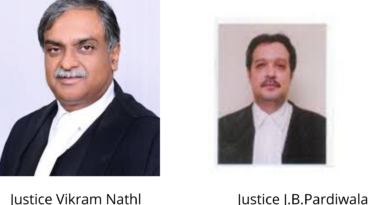Save Academic Freedom Five Teachers Filed Plea In Supreme Court
(Judicial Quest News Network)
Five teachers have filed a plea in Supreme Court mentioning that data stored digitally in devices are seized can be tampered with or distorted, says petition.
The petition seeks due process guidelines that may bind all the investigative agencies in the country.
It is submitted that due to the entirely unguided power exercised by investigative agencies to take control of devices that contain much if not all of a citizen’s personal and professional life, requires to be civilized by way of directives from Supreme Court because several of the persons from whom the devices have been seized in various cases in the recent past are from academic field or authors of repute.
A group of educationists have asked the court to frame guidelines so that the police treat the academic work and research, usually stored in computers they seize during the raids, in a “civilized manner”
A division bench led by Justices Sanjay Kishan Kaul and R.Subhash Reddy issued notice to the Centre and sought a reply in four weeks from the Union Government.
Professor Rama Swamy, Sujata Patel, M.Madhava Prasad, Mukul Kesavan and Deepak Malghan said academicians lose their life’s work when police carry off their computers and drives after raid.
The data stored in those devices would be heir’s life work, at the hands of police their work run the risk of damage, loss, destruction or even distortion.
It is further submitted that In recent years, more and more evidence is being led in criminal (and other) cases in the form of electronic data. Cyber-crime itself relates frontally to material stored in electronic or digital media.
However, even in other kinds of prosecutions, tax proceedings, and cases investigated under various laws by state agencies, evidence is invariably “seized” in the form of electronic/digital devices that store material in various forms recognised by the Information Technology Act, 2000, such as on computers, pen drives, mobile phones, tablets, etc. Additionally, information in cloud based storage is elicited by compelled divulgence of passwords.
Then, the alleged contents are only given with the charge-sheet, when the contents are made public to all regardless of the relevance to the case. This Court, in State of Punjab v Amritsar Beverages Ltd. (2006) 7 SCC 607, while interpreting Section 14 of the Punjab General Sales Tax Act, 1948, which provides for books/documents/accounts seized to be Returned within 60 days, held that hard drives seized under this Section would also have to be returned in the manner prescribed under the Act, and that where literal compliance with such provisions is impossible, recourse to scientific methods is necessary.
This Court also observed that the judiciary “uses its own interpretative principles to achieve a balance when Parliament has not responded to the need to amend the statute having regard to the developments in the field of science.”
The petitioners contended that the right to academic freedom is part of the Fundamental Rights guaranteed by Articles 19(1)(a) and 19(1)(g) of
The Constitution and also part of livelihood and vocation under Article 21. It is also recognised by Article 19 of the International Covenant on Civil and Political Rights (ICCPR, ratified by India) which guarantees the absolute right to hold opinion, and freedom of expression subject to reasonable restrictions.
The Universal declaration of the human rights and codified in the International Covenant on Civil and political Rights, the rights to peaceful assembly and association, privacy and though conscience and religious belif can promote and protect academic freedom Article 15(Right to education) and 15(Right to scientific advancements) of the International Covenant on Economic, Social and Cultural Rights expressly promote rights at the centre of academic freedom.
The Apex Court while issuing the notice to the respondents said that
“We think that at this stage it may be sufficient to first issue notice to respondent and get its response before considering whether notice is required to be issued to other states.”
With prayer to direct to the police and investigative agencies under the purview of control of any or all of the Respondent Central, State and Union Territory governments, specifying suitable guidelines in respect of the seizure, examination and preservation of personal digital and electronic devices and their contents.
The Petition is filed through Advocates Nitya Ramakrishnan and S. Prasanna (AOR)




